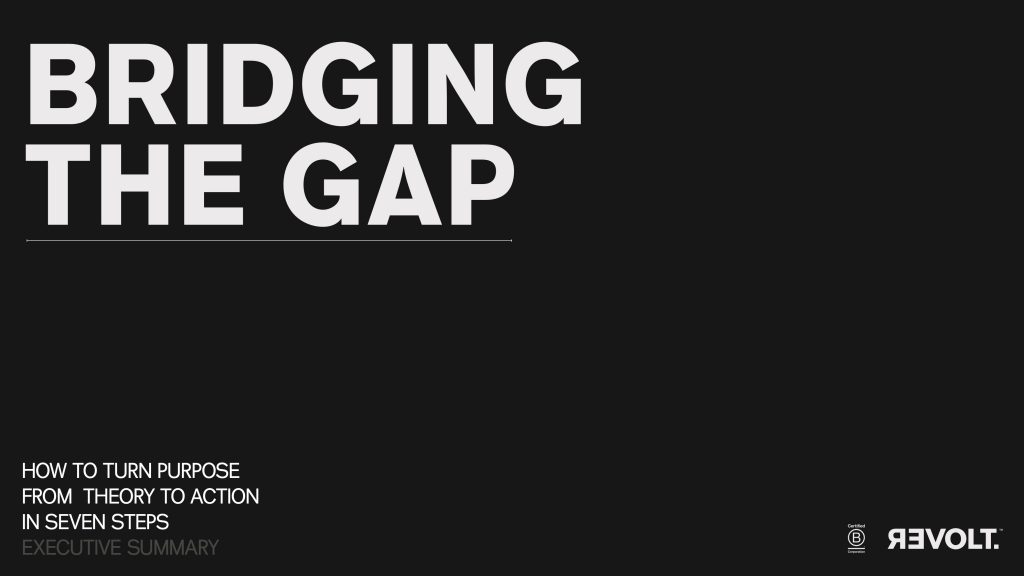As consumers increasingly stand up to what they see as bad corporate behaviour, more companies are focusing their ‘purpose’ on helping to improve the world as a central part of their business and marketing strategy.

Today, 41% of major businesses adopt a brand purpose that is focused on the positive impact they can have on our lives – rather than on products or services – up 14% over the past three years. This is one of the key findings from a first-of-its-kind study into purpose done by specialist brand and marketing agency Revolt.
Through unique analysis of 101 of the world’s leading companies across 12 different categories, Bridging The Gap identifies some of the significant changes companies are embracing to help make the world a better place in a way that drives their commercial strategy. However, the report argues that there is a sizeable ‘purpose gap’ between what employees and consumers seek and what they perceive to be reality.
In contrast to the environmental campaigns of previous decades when corporates were accused of ‘greenwashing’, Revolt found that some companies are now actively involving their whole business in their purpose. The study reveals that 47% of companies are building clear roadmaps enabling the different parts of the business to actively contribute to their purpose goal. For example, Adidas has created a ‘family’ structure uniting its brands under its ‘Through Sport We have the Power to Change Lives’ purpose, and at IKEA all parts of business fall under the single purpose of creating ‘A Better Everyday Life’.
Importantly, Revolt found this business focus on purpose is becoming central to companies’ marketing and creative strategies. The majority of companies – 65% – now actively communicate their purpose activities within their marketing and 27% are using paid media to do this.
And for a growing number of companies this communication is being shaped by the position they are taking in reaction to key world events, such as the death of George Floyd. Revolt found that 77% of companies now communicate around Pride, 53% activate Earth Day and 16% focus efforts on World Refugee Day.
Our heightened awareness of world events and global movements is motivating a growing number of companies to focus their purpose activities on ‘missions’. For example, Unilever has a movement to shift policy on racism and Lego’s is aimed getting more people to recycle. Revolt discovered that over 30% of companies now look to build their reputations through a branded mission.
To help brands ensure that purpose isn’t just a set of words but is an active journey, Revolt has devised seven steps to enable a company to unify its people behind authentic and meaningful purpose action. These steps take businesses through key stages, including: roadmap, vehicle, tools and missions. Revolt used this seven-step process to conduct its unique and extensive research, which included interviews with heads of marketing.
Alex Lewis, Co-Founder and Strategy Lead at Revolt and author of Bridging The Gap, said: “Every sector is flooded with brands trying to get our attention, so it’s crucial that companies give people a reason to support them. More businesses now realise they need to adopt a broader measure of success, with purpose increasingly becoming the ‘north star’.
“It’s movements that inspire people and create emotional connections that stand the test of time. But companies need to embrace a clear purpose framework to avoid falling in the gap between what consumers seek and what they perceive to be reality.”
Source: Revolt

You must be logged in to post a comment Login